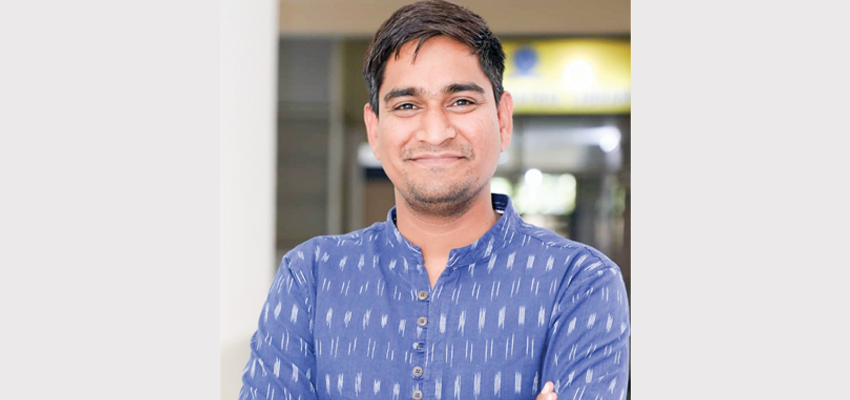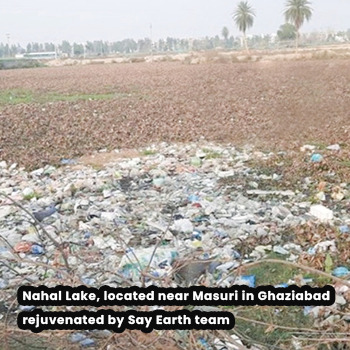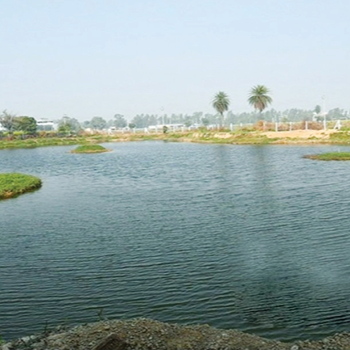Pond Saviour on a Mission

Determined to keep natural water reserves clean and beautiful, Ramveer Tanwar has pursued his vision, rejuvenating over 100 ponds in the last five years, across six states. The “Pondman of India” as he is famously known, Ramveer gave up his engineering job to work for his vision, and started his NGO ‘Say Earth’ in the year 2020, to spread his initiative of rejuvenation and preservation of natural water resources across India. He talked to Corporate Citizen on how he is reaching out to more people and spreading the awareness about the importance of saving the mother Earth from pollution
Whenever Ramveer sees a lake, he reminisces of his childhood spent near the lake back in his village. Whether studying for exams, grazing cattle, enjoying summer mornings or learning to swim, he has lived all of it to the fullest—he grew up experiencing all these. However, with rising water pollution and rampant development works in villages, he feels as though a beautiful part of his life has been taken away.
“During my graduation days, I witnessed rapid concretisation due to various projects in my village. Drainage systems in villages were developed as per the standards of urban areas, while in villages they should be structured differently. All the filth from houses is made to flow into lakes, polluting these water bodies. That’s when I decided to make people aware about the destruction of these water bodies and work to save them,” he said. This led Ramveer to start ‘Jan Chaupal’ campaign, he and his team of volunteers visit gram panchayats, hold informal conversations with villagers, and conduct workshops on lakes and ponds cleanliness. He began this campaign in 2015 from his village Dadha in Gautam Buddha Nagar district of Uttar Pradesh.
Purpose over paycheque

His campaign expanded when Ramveer joined a multinational company in Delhi after his graduation. With every visit to a lake site, he learnt about the deteriorating state of water bodies in the area. Every other lake he came across in that region was either polluted or filled with debris. Though his ‘Jan Chaupal’ campaign was going successful, he felt it was time to seriously work on the ground, with a broader vision. “In two years, I saw lakes deterioting and dying. I couldn't bear such degradation of our lakes, my mind was constantly working on how to rejuvenate these water bodies. Was unable to focus on my office work. So, I decided to leave my job and take this social cause full-time,” said Ramveer.
To gain expertise on advanced pond cleaning techniques, Ramveer travelled to Japan. He also earned certifications in air and water pollution monitoring from the Central Pollution Control Board (CPCB), and completed a traininig course under Green Skill Development Programme by the Ministry of Environment, GoI.
He initially started the lake rejuvenation work in and around the Delhi-NCR, including nearby rural areas. However, he could not sustain these efforts for long without external financial support. “My volunteers and I were running out of money for cleanliness drives. And thus, I started working for local companies to manage the expenses of our work. At that point in time, I realised the need for a formal organisation to take this vision forward,” he recalls. This is how his NGO ‘Say Earth’ came into existence.
Scaling impact

Through his NGO, Ramveer expanded his work across six states of the country — Gujarat, Karnataka, Uttarakhand, Uttar Pradesh, Haryana and Rajasthan. With a core team of 20 members, and over 100 volunteers spread across these states, Ramveer and his team have restored over 100 ponds, over the last five years. Till now, they have been able to collect around 500 to 1000 kgs of plastic waste, from in and around each lake. “It has been five years since we started working to restore the natural ecosystem—lakes accumulate garbage in layers and we remove them one by one, restore natural percolation of water, and plant trees around the area. We also raise funds from corporates and well-wishers, and also take support from local government administrations, to continue our work without hurdles,” says Ramveer.
It has been five years since we started working to restore the natural ecosystem— lakes accumulate garbage in layers and we remove them one by one, restore natural percolation of water, and plant trees around the area
— Ramveer Tanwar
Beyond water
With time, the NGO broadened its focus to include solid waste management, afforestation and women empowerment. For solid waste management, they have partnered with various local startups involved in recycling. Ramveer and his team have carried out afforestation drives in many areas of the Delhi-NCR.
Talking about women empowerment, he said, “We have established various self-help groups for widows, sole earners, and women looking to support their families.” In the latest initiative, the team has trained 12 women to drive e-rickshaws and gave them e-rickshaws free of cost after training. “These women now drive in areas near their villages where no other public transport is available. Today, they are earning enough to support their households with dignity,” he adds.
Along with their various initiatives, the team is also focusing on developing civic sense around cleanliness. “Even if we run cleanliness campaigns, the real change can only come when people’s mindset shifts. They need to understand their responsibility towards nature. Everyone wants electricity, tap water and concrete roads, but no one thinks about the natural resources that support all of that,” he expresses.
Need of behavioural shift
To raise awareness about clean water bodies, the team also runs cleanliness awareness campaigns, especially for school-going children. However, major concerns around solid waste management and unplanned development, still remain.
“People discard solid waste irresponsibily, which eventually ends up into our lakes and ponds. We need more awareness on this issue. Unplanned development without any sustainable planning, is another major concern. Though we have implemented temporary solutions to depollute ponds and lakes filled with household waste, what is truly needed is a long-term fix—a shift in behaviour,” he says.
Well-deserved recognition
Working for years at the grassroots level, Ramveer’s hard work has not gone unnoticed. He has received around 10 national and international accolades, including the Shining World Protection Award from Taiwan with a grant of $10,000, the Rex Karamveer Chakra Award instituted by iCONGO and the United Nations (UN), and the National Youth Icon Award and Water Hero Award by the Government of India.
A call for sustainable change
Development, as Ramveer puts it, is the need of the hour, but it has to be sustainable. “If development comes without sustainable planning, it only brings deterioration of natural water resources. If this is what we call development, we will only be leaving behind filth and decay for the coming generation. When I tell todays generation, I used to swim and spend time near lakes, they don’t believe me because they’ve never experienced such a thing in life,” he says.
Ramveer says that it is everyone's responsibility. "Just like we got to enjoy nature’s gifts, the next generation should also get the same opportunity. They should not have to grow up surrounded by waste, and blame us for it. Otherwise, we are just disrupting everything and calling it progress,” he signs off.